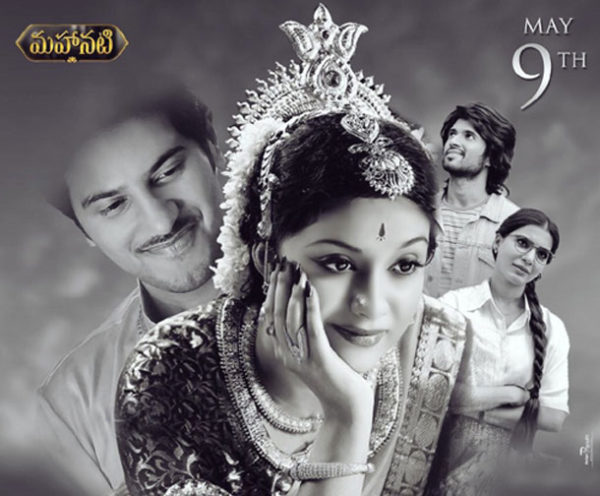The word feisty wouldn’t be enough to describe ‘mahanati’ Savitri. She was childlike in embracing the wonderful moments life presented her with, unafraid to live life on her terms, was generous and also reckless, drowning in a quagmire from which there was no way out. A stammering reporter, Madhuravani (Samantha), a BA gold medallist in journalism battling her own ghosts, is looking for her first big break in journalism. She doesn’t add the suffix ‘garu’ when she asks about ‘Savitri’ to a movie industry veteran (Naresh), who then corrects her saying, ‘Pedda valani gouravinchali. Savitri garini peddavalu kuda gouravinchali’. (You should respect elders. Savitri garu should be respected even by elders).
When we watch biopics, it is very easy to be confused whether it was a good story that gave us the stunning experience or whether it was good filmmaking. Often times, great stories cloak the incompetence in the making of the biopic. Often times, great filmmaking cloaks a mediocre story. But the story of ‘Mahanati’, probably south Indian film industry’s most revered female figure, is a once-in-a-lifetime epic. It is safe to say we are indebted now to Nag Ashwin, who has pulled off a stunner.
It takes a little getting used to as the story moves to Madras as Savitri, backed by her calculative uncle K V Chowdhury (Rajendra Prasad), tries her luck in the movies. A lot has gone into the setting up of Madras and its studios of the 1960s and the effort shows. The eyes linger on frames filled with props, clothes, cameras, trams and cars of that era before being drawn into the story.
There are several cameos — Krish as KV Reddy, Tharun Bhascker as Singeetham Srinivasa Rao, Srinivas Avasarala as LV Prasad, Prakash Raj as Chakrapani and Naga Chaitanya as ANR… the sequence that shows young Savitri’s unabashed admiration of ANR is a lot of fun. And that segment about Savitri shedding precisely two drops of tears from one eye, without glycerine… is that true? Mahanati is packed with anecdotes that trigger curiosity.
The editing by Kotagiri Venkateswara Rao is enthralling as the audience moves between two timelines – a period drama set within a period drama (1980, when Madhuravani is trying to write about Savitri even as the latter is in a coma in the hospital). A hat-tip here to the production design and costume crew. We see Savitri, the cherub-faced 14-year-old, making waves in Madras. We see Savitri mimicking SV Ranga Rao. We see Savitri eating laddus with a fan she adopts as house help (who later steals from her, like a bunch of others who exploit her unwavering generosity). We see Savitri, the wife, ready to sacrifice herself to household chores. We see all these brilliant incarnations of the great actor long before we see her as an alcoholic, unable to deal with her man cheating on her. And it breaks our hearts, like it breaks hers!
Siddhaarth Sivasamy’s screenplay brilliance makes sure this biopic is not just a narration of a well-known story. Madhuravani’s tale in a patriarchal society gives us something to root for. Her love story with Anthony (Vijay Deverakonda), a photographer who loves truth more than his career, isn’t eclipsed by the magnum-opus of a story she is chasing. Little moments like Madhuravani starting her dad’s dilapidated old Luna in one kick, as he challenges one time – to fight for her love – make you feel like you are watching two brilliant stories entangled in one. In a way, we the audience are like Madhuravani, evolving with the story, growing wings as we learn more and more about the great actor, in love with her more than ever before.
The genius of Ashwin also shows in the way he portrays the love tale between Gemini Ganesan (Dulquer Salmaan) and his ammadi (Savitri) with a velvet glove. Despite the maligned love taking a toll on Ganesan’s legacy as an actor, there is no blame game here, no accusations. Ganesan’s egotism and his philandering costs Savitri everything, but the focus firmly remains on how their love, while it lasted, was magically true and how Ganesan did love her until the end.
The brilliant technical crew led by cinematographer Dani Sanchez-Lopez deserves a pat on the back. The shift between black and white and colour is seamless, but I wished the 80s hadn’t been that grainy. The costumes, styling, production design, yesteryear Tamil and Telugu films and songs… Mahanati is a treasure trove that deserves a watch for several reasons. Above all, it’s a celebration of Savitri, the person.




Leave a reply